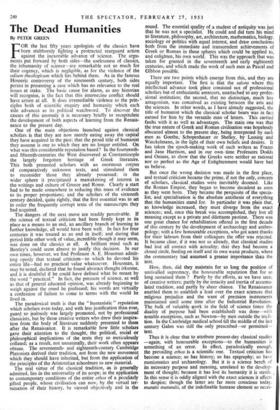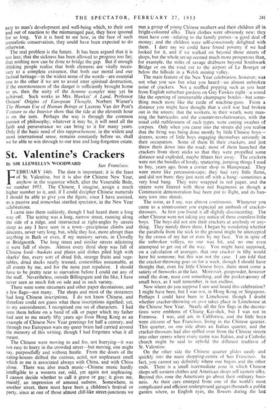The Dead Humanities
By PETER GREEN FOR the last fifty years apologists of the classics have been stubbornly fighting a protracted rearguard action against the inexorable advance of 'science. The argu- ments put forward by both sides—the uselessness of classics. the inhumanity of science—are remarkable not so much for their cogency, which is negligible, as for the violence of the odium theologicum which lies behind them. As in the famous Homeric controversy of the nineteenth century, both sides persist in presenting a case which has no relevance to the real issues at stake. The basic cause for alarm, as any historian will recognise, is the fact that this internecine conflict should have arisen at all. It does irremediable violence to prin-` ciples both of scientific enquiry and humanity which each side advances as its political watchword. To discover the causes of this anomaly it is necessary briefly to recapitulate the development of both aspects of learning from the Renais- sance to the present day. One of the main objections launched against classical scholars is that they are now merely eating away the capital they have acquired in the past; that the proud title of humanist they assume is one to which they are no longer entitled. On what was this considerable reputation based? In the fourteenth- and fifteenth-centuries the West discovered at Constantinople the largely forgotten heritage of Greek literature. This both presented scholars with an enormous corpus of comparatively unknown texts, and stimulated them to reconsider those they already possessed; in the wider sphere it precipitated a reawakening of interest in the writings and culture of Greece and Rome. Clearly a start had to be made somewhere in reducing this mass of evidence to its proper proportions; and the scholars of the sixteenth century decided, quite rightly, that the first essential was to set in order the frequently corrupt texts of the manuscripts they had acquired. The dangers of the next move are readily perceivable. If the science of textual criticism had been firmly kept in its place as a means to an end, an ancillary branch of learning to further knowledge, all would have been well. In fact for four centuries it was treated as an end in itself; and during that period little other work of value, incredible though it may seem, was done on the classics at all. A brilliant mind such as Bentley's could seem almost to justify this decision. In our own times, however, we find Professor A. E. Housman admit- ting openly that textual criticism—to which he devoted his entire life—had no practical value whatsoever. Housman, it may be noted, declared that he found abstract thought irksome, and it is doubtful if he could have defined what he meant by the word " practical." In fact, the pressure of science, as well as that of general educated opinion, was already beginning to weigh against the creed he professed; his words are virtually a confession of failure to come to terms with the world he lived in. The paradoxical truth is that the " humanistic " reputation which scholars even today, and with less justification than ever, guard so jealously was largely promoted, not by professional classicists, but by those creative writers who drew their inspira- tion from the body of literature suddenly presented to them after the Renaissance. It is remarkable how little scholars gave their attention to the thought, the political, social or philosophical implications of the texts they so meticulously collated; as a result, not unnaturally, their work often appears obtuse. The seventeenth- and eighteenth-century Cambridge Platonists derived their tradition, not from the new movement which they should have inherited, but from the application of the principles of the Aristotelian schoolmen to new material. The real virtue of the classical tradition, as is generally admitted, lies in the universality of its scope; in the application to contemporary conditions of the entire ethos of a peculiarly gifted people, whose civilisation can now, by the virtual ter- mination of their history, be viewed objectively and in the round. The essential quality of a student of antiquity was just that he was not a specialist. He could and did turn his mind to literature, philosophy, art, architecture, mathematics, biology, sociology or politics with equal interest, and draw conclusions both from the immediate and transcendent achievements of Greek or Roman in these spheres which could be applied to, and enlighten, his own world. This was the approach that was taken for granted in the seventeenth and early eighteenth centuries, and which made the work of such men as Pascal and Gibbon possible.
There are two points which emerge from this, and they are equally important. The first is that the salons where this intellectual advance took place consisted not of professional scholars but of enthusiastic amateurs, unattached to any profes- sional institution; the second, that no distinction, much less antagonism, was conceived as existing between the arts and the sciences. In other words, as I have already suggested, the title of humanist which the classical scholar bears was in fact earned for him by the versatile man of letters. This carried faults with it as well as advantages. The main one was that the true nature of Greek and Roman civilisation was hopelessly obscured almost to the present day, being interpreted by such -men as Goethe,. Schopenhauer or. Shelley, by Lessing and Winckelmann, in the light of their own beliefs and desires. It has taken the epoch-making work of such writers as Frazer and Jane Harrison, and in our own- time Professors Dodds and Onians, to show that the Greeks were neither so rational nor so perfect as the Age of Enlightenment would have had us believe.
But once the wrong decision was made in the first place, and textual criticism became the prime, if not the only, concern of scholars, classical, studies were inevitably doomed. Like the Roman Empire, they began to become decadent as soon as they were born. They became the perquisite of the specia- list, and specialisation is the absolute antithesis of everything that the humanities stand for. In particular it was plain that, as knowledge increased, they must diverge from the exact sciences; and, once this break was accomplished, they lost all meaning except as a private and dilettante pastime. There was one great chance for rehabilitation offered in the first decade of this century by the development of archaeology and anthro- pology; with a few honourable exceptions, who got scant thanks for their labours from their colleagues the offer was rejected. It became dear, if it was not so already, that classical studies had lost all contact with actuality; that they had become a closed circle, feeding on itself and its own waste products, where the commentary had assumed a greater importance than the text.
How, then, did they maintain for so long the position of unrivalled supremacy, the honourable reputation that for so long sustained them ? Partly by the efforts, as we have Seen, of creative writers; partly by the tenacity and inertia of accumu- lated tradition, and partly by sheer chance. The Renaissance enabled them to establish a lead over the exact sciences that religious prejudice and the want of precision instruments maintained until some time after the Industrial Revolution. The bulk of valuable :work in the field of science (once the duality of purpose had been established) was done—with notable exceptions, such as Newton—by men outside the tradi- tion. In the Cambridge medical school till the middle of the last century Galen was still the only prescribed—or permitted— text.
Thus it is clear that to attribute present-day classical studies —again`, with honourable exceptions—to the humanities is something of an error. In effect, paradoxically enough, the prevailing ethos, is a scientific ope. Textual criticism has become a science; so has history; so has epigraphy; so have numismatics and archaeology. But it is a science bereft of its necessary purpose and meaning, unrelated to the develop- ment of thought; because it has lost its humanity it is sterile. In this sense it is oddly aligned with the exact sciences it affects to despise; though the latter are far more conscious today. mutatis mutandis, of the indefinable humane element so neces- sary to man's development and well-being which, to their cost and out of reaction to the mismanaged past, they have ignored for so long. Yet it is hard to see how, in the face of such unrealistic conservatism, they could have been expected to do otherwise.
The real problem is the future. It has been argued that it is too late; that the sickness has been allowed to progress too far; that nothing now can be done to bridge the gap. But if enough thinking people realise that both elements are vitally neces- sary to a complete existence, that both our moral and our factual heritage—in the widest sense of the words—are essential one to the other if we are to avoid utter spiritual destruction, if the enormousness of the danger is sufficiently brought home to us, then the unity of the honzme complet may yet be achieved. Such works as Mrs. Hawkes' A Land, Professor Onians' Origins of European Thought, Norbert Wiener's The Human Use of Human Beings or Laurens Van der Post's Venture to the Interior show that the tide at the eleventh hour is on the turn. Perhaps the way is through the common pursuit of philosophy; whatever it may be, it will need all the faith and perseverance we can bring to it for many years. Only if the basic need of this rapprochement, in the widest and most international sense, remains constantly before us, shall we be able to win through to our true and long-forgotten estate.



































 Previous page
Previous page